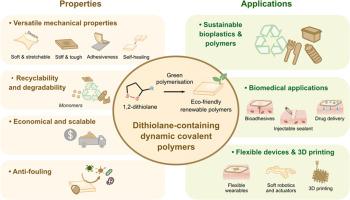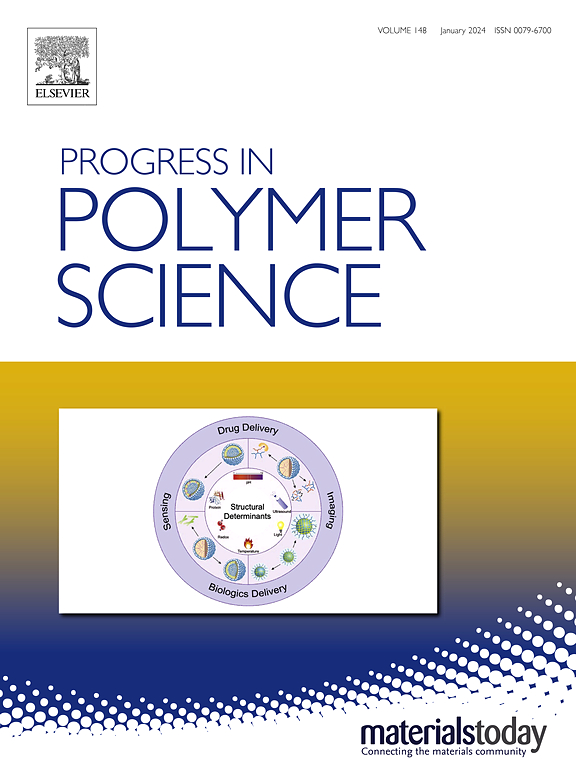Harnessing dynamic covalent chemistry in sustainable biomass-based polymers: Synthesis, dynamic functionalities and potential of dithiolane-containing supramolecular polymers
IF 26.1
1区 化学
Q1 POLYMER SCIENCE
引用次数: 0
Abstract
Most plastics in use today are derived from petrochemical resources, resulting in severe environmental problems. As fossil resources are depleting, polymers derived from sustainable feedstock and manufacturing routes have become increasingly in demand. However, producing bio-based polymeric materials with desired properties remains challenging. Recently, 1,2-dithiolane-containing molecules, such as biogenic thioctic acid, have gained substantial attention as promising feedstocks for developing polymers with advanced features. These molecules can be widely found in animals and plants, and feature a unique five-membered disulfide ring that endows the derived polymers with a combination of functions and properties that rarely appear in traditional biogenic polymers or classical supramolecular polymers. These include responsiveness, biocompatibility, biomedical function, self-healing capability, adhesiveness, recyclability, degradability and tuneable mechanical properties spanning from soft to stiff, without requiring elaborate synthetic processes. In this review, we provide a comprehensive review of the recent advancement in 1,2-dithiolane-containing polymers, summarising their preparation strategies, comparing the latest advances in their properties and discussing their corresponding applications. Finally, we discuss the challenges that need to be addressed in order to integrate these materials harmonically into our daily lives. This review is expected to promote the exploration in the functionalities and applications of sustainable dynamic covalent biomass-based polymers.


在可持续生物质基聚合物中利用动态共价化学:含二硫烷超分子聚合物的合成、动态功能和潜力
目前使用的塑料大多来自石油化工资源,造成了严重的环境问题。随着化石资源的消耗,来自可持续原料和制造路线的聚合物的需求越来越大。然而,生产具有理想性能的生物基聚合物材料仍然具有挑战性。最近,含有1,2-二硫代烷的分子,如生物硫辛酸,作为开发具有先进特性的聚合物的有前途的原料,受到了广泛的关注。这些分子广泛存在于动物和植物中,并具有独特的五元二硫环,使衍生聚合物具有传统生物聚合物或经典超分子聚合物中很少出现的功能和性质的组合。这些特性包括响应性、生物相容性、生物医学功能、自愈能力、粘附性、可回收性、可降解性以及从软到硬的可调机械性能,而不需要复杂的合成工艺。本文综述了1,2-二硫代烷类聚合物的最新研究进展,综述了其制备策略,比较了其性能的最新进展,并讨论了其相应的应用。最后,我们讨论了需要解决的挑战,以便将这些材料和谐地融入我们的日常生活。本文对可持续动态共价生物质基聚合物的功能和应用进行了综述。
本文章由计算机程序翻译,如有差异,请以英文原文为准。
求助全文
约1分钟内获得全文
求助全文
来源期刊

Progress in Polymer Science
化学-高分子科学
CiteScore
48.70
自引率
1.10%
发文量
54
审稿时长
38 days
期刊介绍:
Progress in Polymer Science is a journal that publishes state-of-the-art overview articles in the field of polymer science and engineering. These articles are written by internationally recognized authorities in the discipline, making it a valuable resource for staying up-to-date with the latest developments in this rapidly growing field.
The journal serves as a link between original articles, innovations published in patents, and the most current knowledge of technology. It covers a wide range of topics within the traditional fields of polymer science, including chemistry, physics, and engineering involving polymers. Additionally, it explores interdisciplinary developing fields such as functional and specialty polymers, biomaterials, polymers in drug delivery, polymers in electronic applications, composites, conducting polymers, liquid crystalline materials, and the interphases between polymers and ceramics. The journal also highlights new fabrication techniques that are making significant contributions to the field.
The subject areas covered by Progress in Polymer Science include biomaterials, materials chemistry, organic chemistry, polymers and plastics, surfaces, coatings and films, and nanotechnology. The journal is indexed and abstracted in various databases, including Materials Science Citation Index, Chemical Abstracts, Engineering Index, Current Contents, FIZ Karlsruhe, Scopus, and INSPEC.
 求助内容:
求助内容: 应助结果提醒方式:
应助结果提醒方式:


